The American Quarter Horse is one of the most popular breeds in the United States and THE most popular stock horse breed. Part of what makes them so popular is their normally docile temperament and willingness to do whatever they can to please their rider. Let’s have a detailed look at the temperament of the American Quarter Horse.
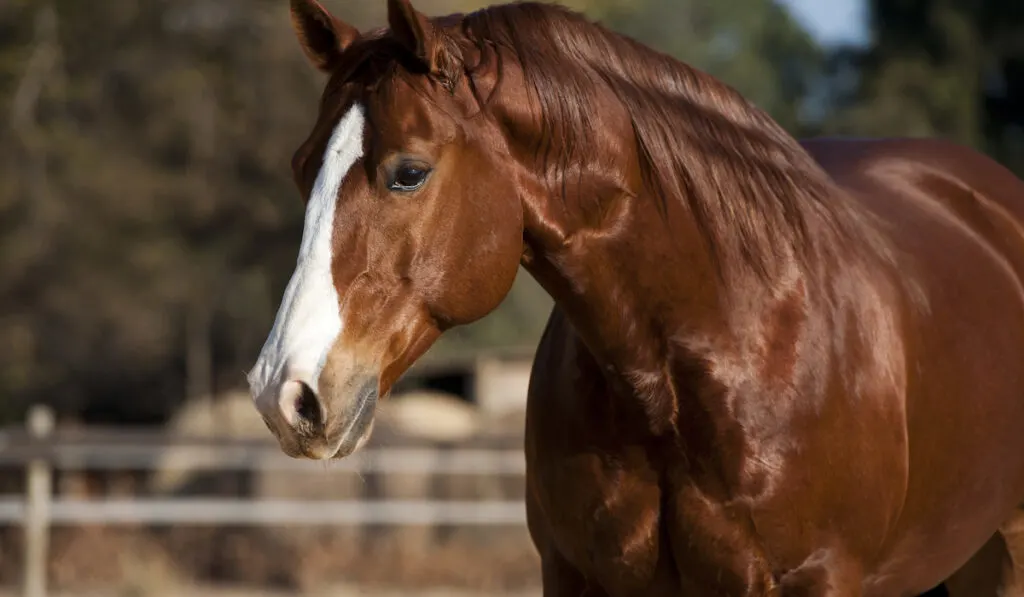
What is the temperament of a Quarter Horse? Quarter Horses are typically docile and very trainable. Their calm disposition often makes them a great choice for beginner riders and their versatility and athleticism make them a great choice for riders in almost any discipline.
Table of Contents
The Gentle and Easy Going Quarter Horse
If you ask most people about the temperament of the American Quarter Horse they are probably going to tell you that they are gentle and easy-going. In fact, their docile temperament and trainable nature makes them great candidates for beginner riders.
Most people who purchase a Quarter Horse as their first horse won’t ever regret that decision. Most members of the breed are not easily spooked, enjoy trail and arena riding and, with proper training, can become excellent horses for children and adults alike.
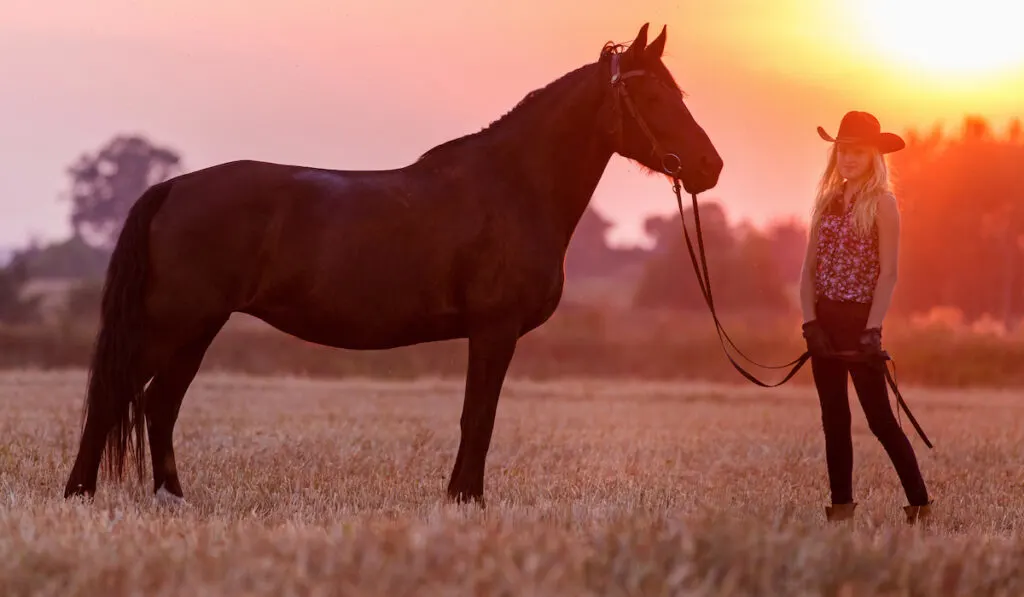
A lot of this has to do with the way the breed was developed. The breed was developed by ranchers for ranching. Horses had to be willing to work a full day on the ranch checking fence and tending to cattle but still be quick enough to match race a quarter mile down the main street.
As horseback riding evolved to be more for pleasure than for work, so too the breed changed. Different lines of Quarter Horses have been bred specifically for specific disciplines.
You could, for example, find a 13.2 hand cutting horse that is as agile as a cat or a 17.2 hand hunter horse that has a beautifully elegant long trot and graceful form over 4 foot fences.
Just the same, you could find a 14 hand quarter horse that can do both. It’s that versatility within the breed that helps make them extremely popular. But the temperament of the quarter horse isn’t attained by genetics alone. There are several factors that contribute.
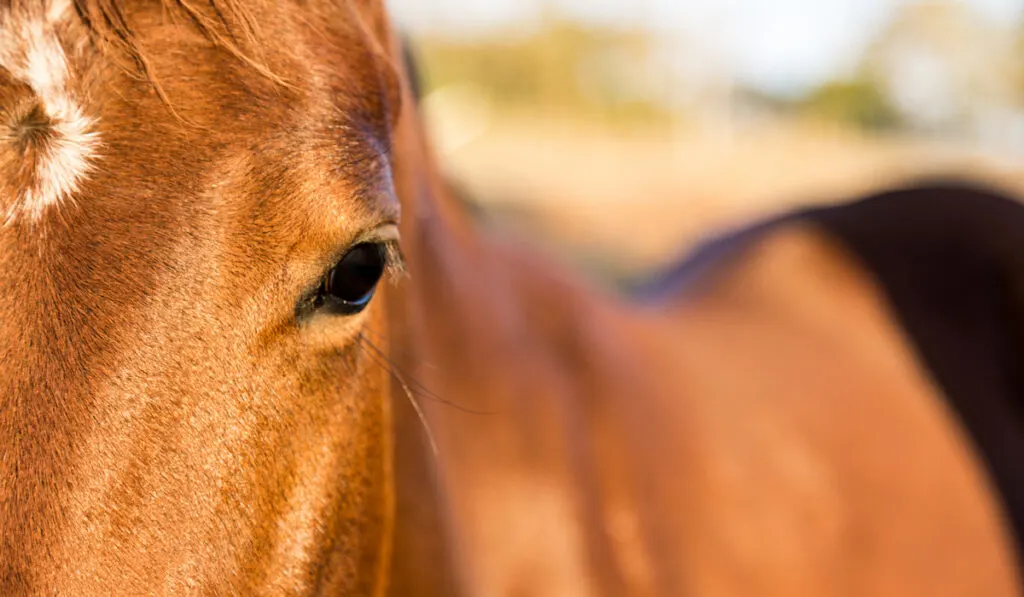
How Temperament Develops in Horses
A horse’s temperament is influenced by a variety of different factors. Because there are many components, there is a high amount of variability within any breed, including the Quarter Horse. The easiest thing to do is break down horse temperament into its main components.
Breeding / Pedigree
Breeding and pedigree do have a big influence on the temperament of a quarter horse. Different lines are bred for specific disciplines. While all Quarter Horses can be very versatile, each equestrian discipline lends itself to horses who possess specific traits.
Barrel Racing horses, for example, tend to be hotter, more energetic horses. These horses are happy to go fast whenever and wherever their owner asks them to. As such, pedigrees that include racing bloodlines are more likely to produce a foal that also likes racing.
Some other disciplines require lots of energy too. A cutting horse needs plenty of stamina both in the ring and out in the pasture. Cutting cows and keeping them separated from the herd can be hard, taxing work.
Cutting horses are also, typically, hotter or more energetic than most Quarter Horses used for recreational riding.
Similarly, some horses just seem to inherently want to go slow. These types of horses have made their mark in Hunt Seat Equitation and Western Pleasure classes.
Individual Nature
Regardless of a horse’s breeding, each horse is an individual. Some horses want to go slow and some want to go fast. I once knew an Appendix Quarter Horse, bred specifically for racing, that had no desire to run. She would get tired and want to break into a trot or walk.
Sometimes, even if a Quarter Horse is bred for a specific type of temperament that lends well towards a specific discipline, they still have to be evaluated as an individual.
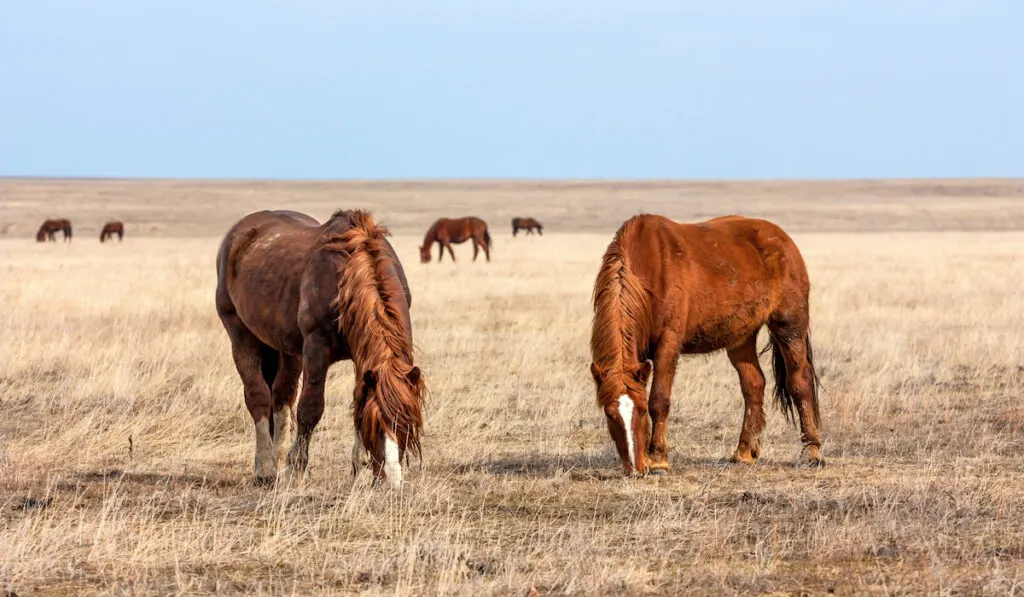
Nurture
The way a horse is nurtured throughout its young years can also have an effect on how it’s temperament develops. If a horse is treated kindly and fairly, it is not likely to have any fear of people.
If, on the other hand, a horse is treated roughly OR not provided enough discipline, the horse could learn to become fearful and reactive or even aggressive.
While these things are part of the horse’s temperament, it has nothing to do with the breed and more to do with the way they were raised or handled.
Training
Training kind of goes hand in hand with nurture but it is a little different. Proper training, both on the ground and in the saddle, can give your horse a great set of building blocks from which it can make decisions.
Everything a horse does while you handle it or ride it is a decision. It is crucial that the training process teach a horse how to make the right decisions in unknown situations.
For trail horses, for example, desensitization to scary or unknown objects can help prepare him for a wayward piece of trash blowing across the trail or a deer that suddenly appears from nowhere.
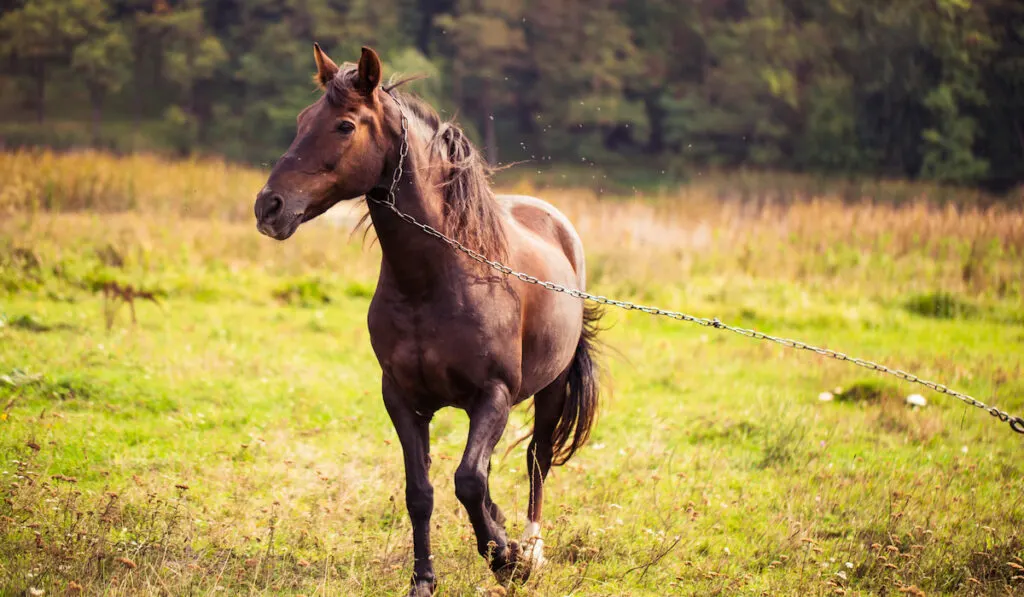
A horse who has learned to stop and think in a suddenly fearful or unknown situation is less likely to injure its rider than one who turns and runs because that is the only thing he knows how to do.
Similarly, adequate groundwork can teach a horse to trust when you ask him to go forward and stop when you need him to. If he is ever in a sticky situation or having to walk through an unknown place the horse is better able to respond to your commands because he has the training and reinforcement to trust what you ask of him.
A wild quarter horse with no training and a wild mustang with no training aren’t altogether that different. I know, I’ve handled both! Training makes a big difference in a horses perceived temperament whether that horse is pedigreed or not!
Generalities for Specific Lines
Having acknowledged that pedigree is only one factor in a Quarter Horse’s temperament we can then look constructively at different personality traits that certain lines of Quarter Horses are “known” for. Let’s have a look at some of the more common ones:
Hancock Horses
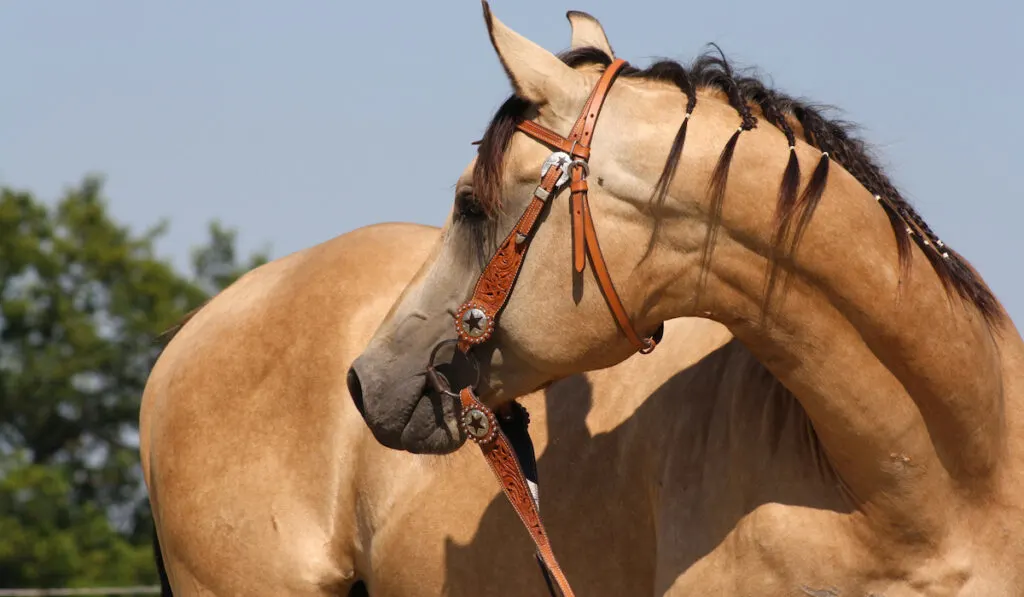
Quarter Horses from Hancock bloodlines are rumored to be “good buckers”. They are well-liked and revered for ranch horses and roping horses but, rumor has it, that most Hancock bred horses are good at throwing some good bucks before they get settled down for work.
I personally had the pleasure of riding a bay roan Hancock bred mare for years who was one of the nicest, laid back, easy-going horses you’d ever meet. She never once bucked with me the years we had her.
On the other hand, I knew a Hancock gelding that would “break in two” or start bucking wildly, for seemingly no reason at all. If his rider stayed on, he’d continue about his day as if nothing happened and would not buck again. The next day, the cycle would repeat.
Despite this “habit” that Hancock bred Quarter Horses are known for, their nice heads, good balance, toughness, and soundness make them great ranch horses and well-liked among ranchers.
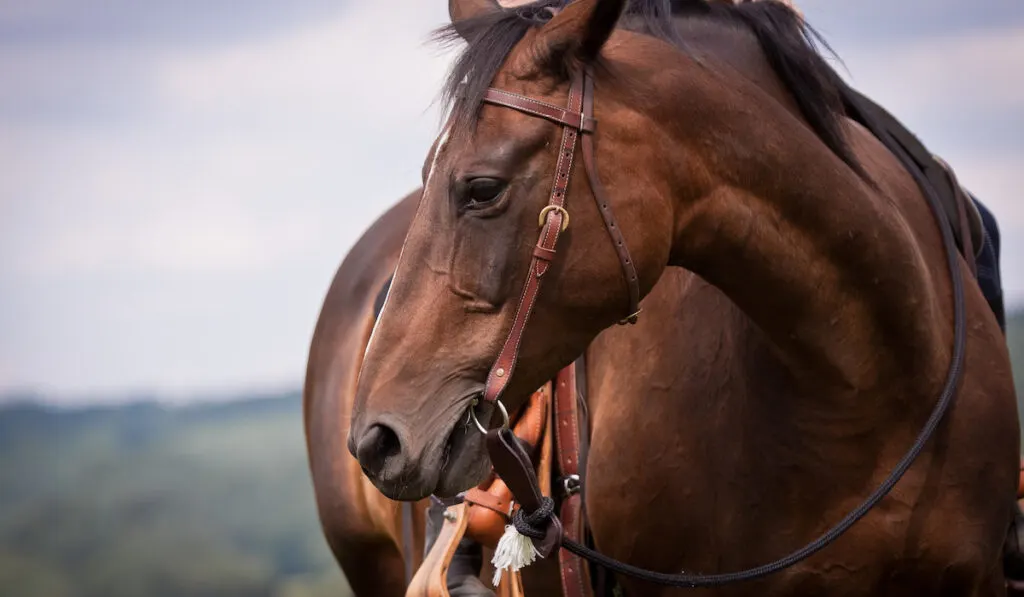
Born Broke
On the other end of the spectrum, some Quarter Horse bloodlines are known for horses who seem to be “born broke”. Their temperaments are touted for being naturally calm, cool and collected seemingly straight from the womb.
These bloodlines can vary depending on who you ask but the ones I hear a lot are foundation horses from “Jackie Bee” lines and, more recently, horses who descend from popular Quarter Horse sires, Zips Chocolate Chip and Invitation Only.
These two stallions produce awesome western pleasure and hunter horses (and their babies compete in many other disciplines too). It seems that horses from lines bred primarily for rail work seem to be calmer and easier than horses bred for active work like cutting and reining.
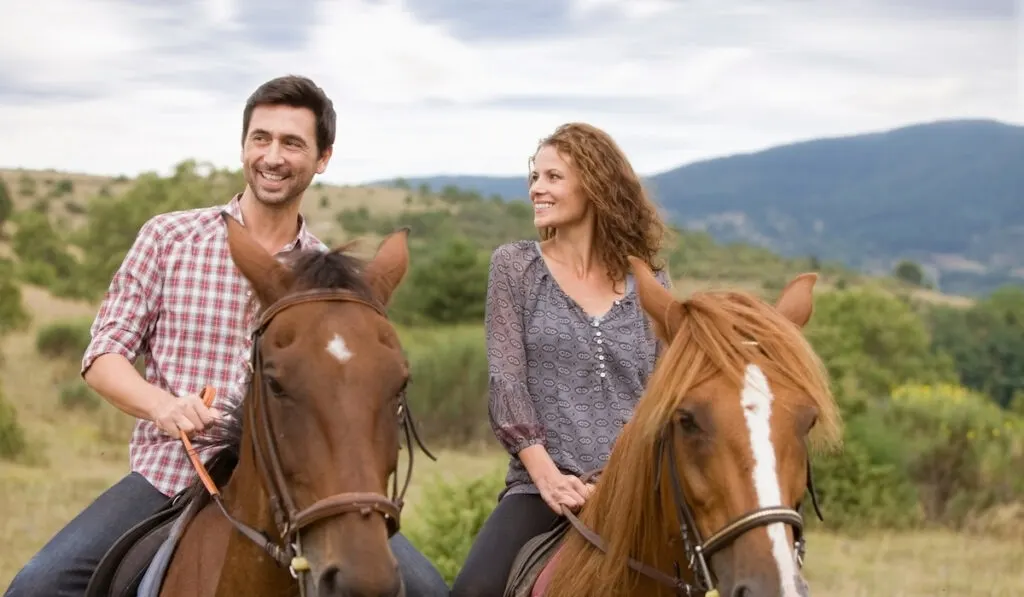
How to Get a Quarter Horse with the Right Temperament
When choosing your own Quarter Horse it may be wise to start your search looking for horses from specific bloodlines known to be calm, quiet and easy but, remember that each horse is an individual and temperament isn’t something that can be generalized across an entire breed.
The best way to make sure you are getting a Quarter Horse with the temperament you desire is to actually visit the horse and handle and/or ride it.
In fact, when you can, riding or handling a horse on multiple days in as many different environments as possible will give you a good look at what his true temperament might be.


